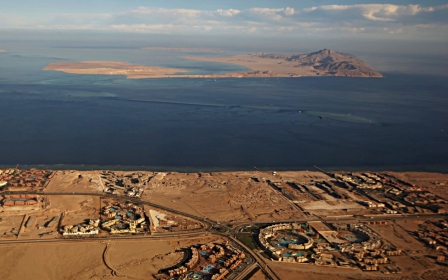Egypt court rejects plan to give Red Sea islands to Saudis

A top Egyptian court on Monday rejected a plan to transfer two uninhabited Red Sea islands to Saudi Arabia in a deal that provoked outrage among Egyptians.
The Egyptian government had appealed against a lower court ruling in June that found the controversial border demarcation agreement was illegal.
But the courtroom erupted in cheers on Monday as the judge delivered the final verdict on the issue, with lawyers and activists chanting: "These islands are Egyptian."
Tiran and Sanafir are our right, Egypt’s right, the right of our children and of our ancestors who were killed there
- Island protest organisers
Ownership of Tiran and Sanafir, the uninhabited islands at the entrance to the Gulf of Aqaba, has long been disputed, with Cairo and Riyadh both claiming them, although they have been under Egyptian control for more than 30 years
They are considered strategically important because they lie on the key sea route to the Jordanian port of Aqaba and the Israeli port of Eilat.
The islands were occupied by Israel in 1967 during the Six Day War, before being handed back to Egypt in 1982 when the two sides signed the Camp David peace accords.
Islands deal resulted in aid
A deal to hand over the islands was signed during a visit to Cairo last year by Saudi King Salman, when Riyadh showered Egypt with aid, provoked accusations that the government had "sold" the strategic islands.
Cairo said the islands were Saudi to start with but had been leased to Egypt in the 1950s. But the court said it was its "unanimous" decision that the two islands were sovereign Egyptian territories.The islands saga has deeply wounded national pride and brought people out onto the streets against the government of president Abdel Fattah al-Sisi. “Our right to this land is won by blood, not by documents and maps,” protest organisers wrote on their Facebook page at the time, while showing images of Egyptian soldiers on the island of Tiran in 1967.
“We gave more than 100,000 martyrs in our wars with Israel to restore this land. Tiran and Sanafir are our right, Egypt’s right, the right of our children and of our ancestors who were killed there.”
More than 150 protestors were jailed following mass protests against the decision, according to Human Rights Watch.
The Muslim Brotherhood said at the time "that no one has the right to abandon the property and resources of the Egyptian people in exchange for a fistful of dollars".
Cairo and Ryiadh ties may get complicated
But this latest and final ruling may complicate ties between Egypt and Saudi Arabia, a main financial backer of Sisi since he came to power in 2013.
Relations have cooled over Egypt's stance on Syria, which is seen as closer to Russia: Moscow backs President Bashar al-Assad, while Saudi Arabia supports rebels fighting to topple the Damascus government.
In 2010, Egypt and Saudi Arabia began formally discussing the drawing of their maritime borders, including the ownership of the two islands.
The islands deal was one of several choreographed announcements during King Salman's visit. More than a dozen other accords, including plans for a Red Sea bridge and a memorandum of understanding to set up an industrial zone in Egypt, were also announced at the time.
Stay informed with MEE's newsletters
Sign up to get the latest alerts, insights and analysis, starting with Turkey Unpacked
Middle East Eye delivers independent and unrivalled coverage and analysis of the Middle East, North Africa and beyond. To learn more about republishing this content and the associated fees, please fill out this form. More about MEE can be found here.





